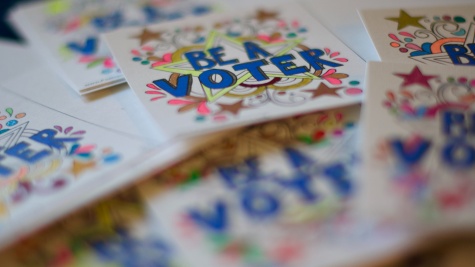Evaluating the most effective approaches to correcting voter fraud misperceptions
The MIT Election Data and Science Lab helps highlight new research and interesting ideas in election science, including through research grants under our ongoing Learning from Elections program.
Our post today was written by John Carey, Brian Fogarty, Brendan Nyhan, and Jason Reifler, based on their ongoing research funded by this program. The information and opinions expressed in this column represent their own research, and do not necessarily represent the opinions of the MIT Election Lab or MIT.
The goal of this project is to examine the prevalence of voter and election fraud beliefs and to evaluate the effectiveness of different approaches to address misperceptions about fraud and to increase confidence in election administration. This project uses survey data (both cross-sectional and panel) and survey experiments.
With MEDSL support, we conducted a three-wave survey experiment around the 2022 midterm elections. The first wave was fielded before the election by YouGov from October 18-November 7, 2022 (n=3,772); the second wave was fielded December 7-20 (n=2,986); and the third wave was conducted January 21-30, 2023 (n=2,030). Each wave tests interventions intended to address misperceptions about the administration of elections in the United States.
In the first wave of the study, participants were randomized into one of three conditions. The first treatment condition, which we call credible corrections, consisted of four articles describing Republican judges and officials affirming the legitimacy of the 2020 election (one was adapted from the “Lost, Not Stolen” report, two were adapted from media articles, and one was constructed using quotes from leading GOP officials).
The second treatment condition, which we call CISA+inoculation, presented participants with articles debunking myths about the security and integrity of the voting process adapted from the Cybersecurity and Infrastructure Security Agency (CISA) in the framework of an inoculation intervention, which warns people of a future persuasive threat (“Here is the truth about some claims you might hear concerning the 2022 midterm elections that will be held this November”). The messages emphasized the institutional mechanisms and protections used to ensure the integrity of the election process. We expected these sources to be surprising and credible to skeptics. The third condition used placebo content.
Results from the first wave indicate that both treatments increased retrospective confidence in the results of the 2020 election and decreased the perceived prevalence of voter and election fraud in 2020. The credible correction correction treatment decreased the perceived number of seats that participants expected to be won due to fraud in 2022 while the CISA+inoculation treatment increased prospective confidence in the 2022 election results.
We readministered our outcome measures at the beginning of the second and third survey waves to test for the persistence of these effects. Prior exposure to the CISA+inoculation treatment significantly reduced the perceived prevalence of fraud in 2020 and the perceived number of seats won due to fraud in 2020 and 2022 in the second wave. No such effects were found for exposure to the credible corrections treatment. In the third wave, we found that confidence in the integrity of the 2022 results was significantly higher among respondents assigned to either treatment in the first wave than among those assigned to placebo. However, the CISA+inoculation treatment also significantly reduced the perceived prevalence of fraud in 2022, an effect that was not observed for the credible corrections treatment. Finally, neither had significant effects on perceptions of the more distant 2024 election (expected integrity, fraud prevalence, or seats won due to fraud).
In the second wave, respondents were also independently randomized into a separate survey experiment testing the effect of an intervention targeting the prominent fraud or election malfeasance claim from the 2022 midterm elections — the claims that were being made about ballot printing errors in Maricopa County, Arizona by Republican gubernatorial candidate Kari Lake and her allies, who falsely claimed that votes in conservative areas of Arizona’s most populous county were not being counted. We examined whether a correction treatment targeting these false claims would reduce belief in Lake’s claim and belief that her opponent, Katie Hobbs, was not the rightful winner. We also tested if debunking a specific, prominent myth would affect Americans’ overall confidence in the 2022 election results. Our results indicate that exposure to the fact-check reduced false beliefs about election administration in Maricopa County and the rightful winner of the race. However, it had no measurable effects on perceptions of the 2022 (or 2020) election.
Finally, the third survey wave featured a separate intervention disaggregating the effects of CISA messages from the inoculation intervention. Unlike the first wave, in which respondents who received CISA articles all received the additional language adapted from the inoculation literature, respondents in the third wave were independently randomized to a version of the CISA messages condition with inoculation instructions, a version without instructions, or to a placebo condition. (The specific corrections were different from those used in the first wave.) This approach allows us to vary the presence of instructions inspired by the research literature on inoculation that warned participants of future exposure to potentially misleading information, allowing us to isolate the effect of process-oriented correction content from the warning of future exposure to misinformation.
We find strong evidence that the CISA correction is effective at decreasing beliefs about the prevalence of fraud in the 2024 elections. (The intervention falls just short of statistical significance for several other outcomes.) Though we face limits of statistical power, we find no measurable evidence that the effects of the CISA correction vary based on exposure to inoculation instructions. Finally, we confirm that the CISA correction increases discernment between specific true and false claims about elections related to the treatment content.
Our preliminary results indicate that both correction approaches that we evaluated were effective at reducing misperceptions and increasing confidence in election results at least in part. However, a messaging approach that provided information about procedural protections against fraud using corrections provided from CISA was more effective at durably reducing fraud misperceptions than a source-oriented credible corrections approach. The second wave demonstrated that debunking a specific election fraud myth was effective only at reducing misperceptions directly related to that myth and did not increase confidence in election administration nationally. Finally, the third wave showed that the content of the CISA corrections approach drives the results we observe, not the presence of instructions warning about future exposure to misinformation.


